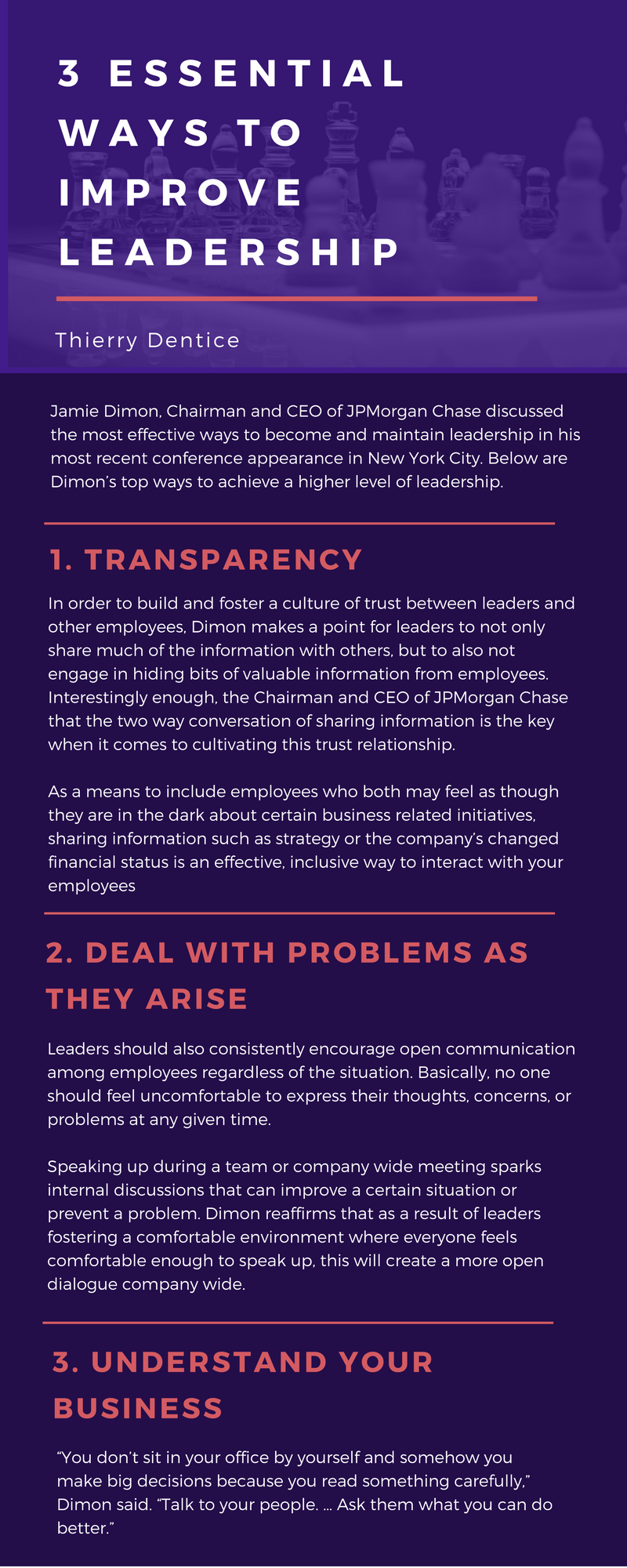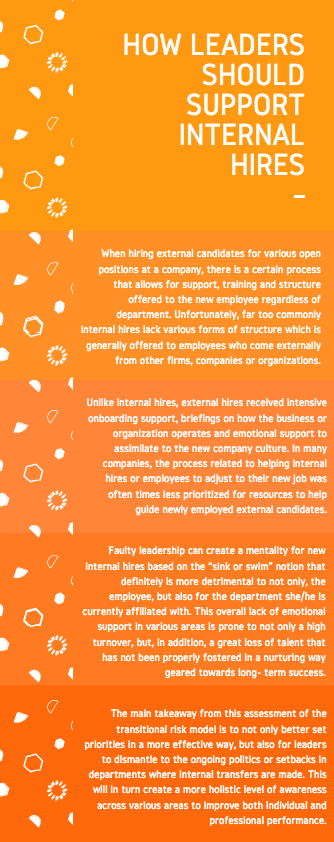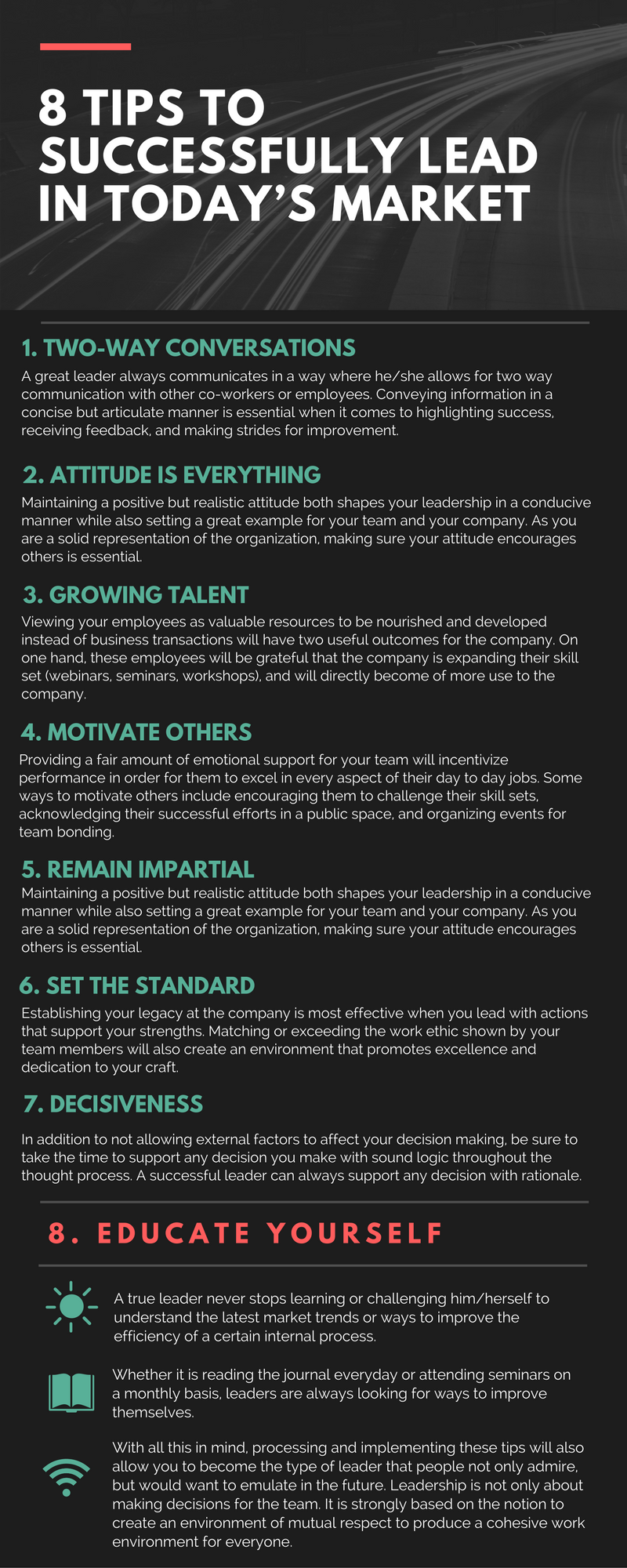Tag: communication (page 2 of 3)
Jamie Dimon, Chairman and CEO of JPMorgan Chase discussed the most effective ways to become and maintain leadership in his most recent conference appearance in New York City. Below are Dimon’s top ways to achieve a higher level of leadership.
1. Transparency
In order to build and foster a culture of trust between leaders and other employees, Dimon makes a point for leaders to not only share much of the information with others, but to also not engage in hiding bits of valuable information from employees. Interestingly enough, the Chairman and CEO of JPMorgan Chase that the two way conversation of sharing information is the key when it comes to cultivating this trust relationship.
As a means to include employees who both may feel as though they are in the dark about certain business related initiatives, sharing information such as strategy or the company’s changed financial status is an effective, inclusive way to interact with your employees
2. Deal with problems as they arise
Leaders should also consistently encourage open communication among employees regardless of the situation. Basically, no one should feel uncomfortable to express their thoughts, concerns, or problems at any given time.
Speaking up during a team or company wide meeting sparks internal discussions that can improve a certain situation or prevent a problem. Dimon reaffirms that as a result of leaders fostering a comfortable environment where everyone feels comfortable enough to speak up, this will create a more open dialogue company wide.
3. Understand your business
With the constant changes and mishaps in any business, it can be common for leaders to be out of touch or even disconnected from the needs of their employees. While this is a difficult to achieve, it is important for leaders to connect or touch base with employees of all levels or departments to gain a better understanding of how the organization can improve.
“You don’t sit in your office by yourself and somehow you make big decisions because you read something carefully,” Dimon said. “Talk to your people. … Ask them what you can do better.”
Flexibility
Breaking up the monotony of the work day is an important adaptation that companies should implement as workplace practices change. Evaluating employee efficiency on work actually produced rather the space which is completed is how both younger and more established companies are viewing the work from home situation.
Many companies have adopted make your own schedule policies and research shows that allowing employees to do so increases productivity. As each person has both extroverted and introverted qualities, and allowing employees a certain level of flexibility to work in their comfort zone is essential.
Believe it or not, many employees actually strive when offered with a work from home option to your employees is a great way to boost happiness. Offering all your employees the same benefit could add a new layer of potential brand loyalty in the future of the company’s culture.
Be transparent
Honesty is truly key when it comes to crafting effective leadership across multiple industries. Stressing over rumors of layoffs or fears of economic downturn only serve to disrupt an employee’s focus. Even if the only news you have to share is bad news, be honest. Instead of bottling up all the stress and unintentionally lashing out at employees, transparency will reduce anxiety for all parties involved.
Finding narrative
While it is true that younger employees do tend to switch jobs at a faster rate in order to gain experience, salary increases, etc., this does not necessarily mean that they are not in need of mentorship. Studies have shown that loyalty does indeed breed loyalty. Along with helping your employees see how the work they do benefits them, tailor advice and information in a way that has the biggest positive impact for them. Helping younger employees help you most effectively do your job is vital.
1. Two-way conversations
A great leader always communicates in a way where he/she allows for two way communication with other co-workers or employees. Conveying information in a concise but articulate manner is essential when it comes to highlighting success, receiving feedback, and making strides for improvement.
2. Attitude is everything
Maintaining a positive but realistic attitude both shapes your leadership in a conducive manner while also setting a great example for your team and your company. As you are a solid representation of the organization, making sure your attitude encourages others is essential.
3. Growing talent
Viewing your employees as valuable resources to be nourished and developed instead of business transactions will have two useful outcomes for the company. On one hand, these employees will be grateful that the company is expanding their skill set (webinars, seminars, workshops), and will directly become of more use to the company.
4. Motivate others
Providing a fair amount of emotional support for your team will incentivize performance in order for them to excel in every aspect of their day to day jobs. Some ways to motivate others include encouraging them to challenge their skillsets, acknowledging their successful efforts in a public space, and organizing events for team bonding.
5. Remain impartial
Try to your best to avoid engaging in any favoritism with any co-worker at the office. Remember to evaluate an individual based on his/her performance, how they challenge themselves, and the ways they want to improve the company’s mission. Showing impartial respect to others is the best form of effective leadership.
6. Set the standard
Establishing your legacy at the company is most effective when you lead with actions that support your strengths. Matching or exceeding the work ethic shown by your team members will also create an environment that promotes excellence and dedication to your craft.
7. Decisiveness
In addition to not allowing external factors to affect your decision making, be sure to take the time to support any decision you make with sound logic throughout the thought process. A successful leader can always support any decision with rationale.
8. Educate Yourself
A true leader never stops learning or challenging him/herself to understand the latest market trends or ways to improve the efficiency of a certain internal process. Whether it is reading the journal everyday or attending seminars on a monthly basis, leaders are always looking for ways to improve themselves.
With all this in mind, processing and implementing these tips will also allow you to become the type of leader that people not only admire, but would want to emulate in the future. Leadership is not only about making decisions for the team. It is strongly based on the notion to create an environment of mutual respect to produce a cohesive work environment for everyone.
The book titled “Traction” by Gino Wickman focuses on how to grow your company or “scale up” when the opportunity to expand presents itself. While research has shown that companies struggling to grow or expand find it difficult to break into their growth phase, gathering information from other leaders or entrepreneurs is a key step in order to assess what the appropriate steps are moving forward.
In addition to the insight given by Ken Dunn, here are some tips that any aspiring leader or current manager should actively implement in their day to day tasks. With this in mind, the below are three essential skills that managers, leaders, and other upper management officials need to be aware of as business expansion ensues.
Keep it simple
The best managers and leaders should have the useful skill of framing a very complex issue in simple terms. Though a skill that often times take months or years to develop, the right environment can help any leader acquire this important quality.
As these leaders will be required to guide a team throughout this new process, conveying intricate processes and difficult situations in plain language will not only help everyone comprehend what is going on around them, but will also make the complicated seem easy to understand.
Work with your team
Creating a two way working relationship with each of your teammates allows for both an easy information flow while also funneling growth to empower development. As a manager or leader, it is your job to find strengths in your subordinates in order to decipher how to best expand this skillset to the next step.
Each employee on your team has a different set of strengths, weaknesses, and areas of improvement, and it is essentially the manager primary goal to improve the subordinate in every way he/she can. As this is a huge part of your role, providing constructive criticism and a strategic approach to rectify this You can learn from everyone you manage.
Structure
The next step from the previous tip, managers also need to set goals for career-related growth as to make sure all their skills are properly utilized. Improving skills are in the best interest of both the employee and the company, and effectively bridging the two is vital for overall growth.













